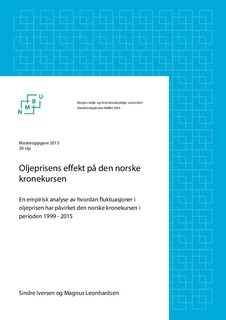| dc.description.abstract | Hvordan oljeprisen svinger og påvirker norsk økonomi gjennom valutakursen, vekker stor interesse i media og hos aktører i valutamarkedene. I denne analysen har vi valgt å bruke empirisk analyse gjennom regresjonsanalyse, kointegrasjon og feilkorrigeringsmodeller, for å studere oljeprisens effekt på kronekursen. Ved et ukentlig datasett fra 1999 – 2015 analyserer vi hvordan en eventuell sammenheng mellom oljepris og kronekurs endres med hvilken valutakurs man analyserer.
Det identifiseres forskjellige sammenhenger for hvordan oljeprisendringer har påvirket kronekursen på kort og lang sikt. Vi finner at negative oljeprissjokk påvirker kronekurs, men kun målt mot amerikanske dollar og euro. For britiske pund derimot påvirkes ikke valutakursen av oljeprissjokk. På lang sikt identifiserer vi ved kointegrasjonsanalysen kun signifikante sammenhenger mellom oljepris og kronekurs målt mot amerikanske dollar. Ved feilkorrigeringsmodellen identifiserer vi på kort sikt signifikante sammenhenger mellom oljepris og kronekurs målt mot amerikanske dollar, britiske pund og euro. Oljeprisen bruker likevel uendelig lang tid på å korrigere kronekurs tilbake til likevekt.
How the oil price fluctuates and affects the Norwegian economy through the exchange rate arouses great interest through media and for the exchange rate market participants. In this analysis we have used empirical methods as regression analysis, co-integration and error correction models to study the effect of oil price changes on the Norwegian exchange rate. By using weekly data from 1999 – 2015 we analyze how a possible relationship between the oil price and Norwegian exchange rate changes with which exchange rate that are analyzed.
We identify evidence of different relationships for how changes in the oil price have affected the exchange rate in the short and long term. We find that negative shocks in the oil price affects only the Norwegian exchange rate measured against the US dollar and euro, while oil price shocks does not affect the Norwegian exchange rate when we measure against the British pound. In the long term, we find only co-integrating relationships between the oil price and the Norwegian exchange rate measured against the US dollar. In the short term analysis, the error correction model identifies significant relationship between the oil price and the Norwegian exchange rate measured against the US dollar, the British pound and the euro, but the oil price uses infinitely long time to correct the Norwegian exchange rate back to the long run equilibrium. | nb_NO |
